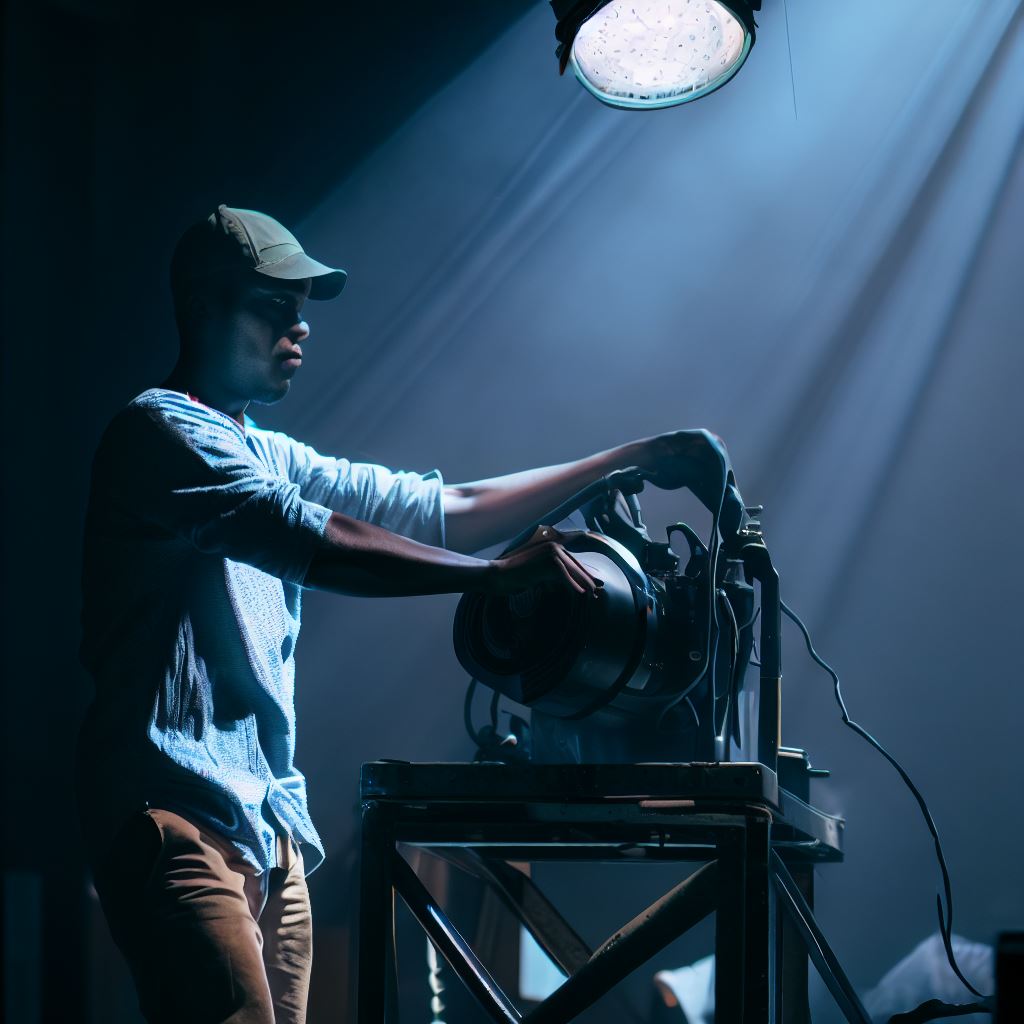Introduction
In the vibrant world of Nigerian theatre, where storytelling comes to life through a tapestry of vivid performances, one often underappreciated yet indispensable force wields a powerful influence: the Lighting Technicians.
These unsung heroes possess the unique ability to shape the very essence of a production, illuminating the stage with a mastery that transcends mere technical skill.
Their expertise goes far beyond the manipulation of light; it encompasses a profound understanding of ambiance, mood, and storytelling, breathing life into every scene and captivating audiences in a mesmerizing dance of illumination.
In this exploration, we delve into the profound impact that Lighting Technicians have on the Nigerian theatrical landscape, unraveling their pivotal role in crafting unforgettable experiences for both performers and spectators alike.
Role of Lighting Technicians in Nigerian Theater
Lighting technicians play a crucial role in Nigerian theater productions, contributing to the overall success and impact of the performances.
Their responsibilities involve designing, operating, and maintaining the lighting equipment necessary for stage productions.
Overview of the responsibilities of lighting technicians
One of the primary responsibilities of lighting technicians is designing and implementing lighting effects.
With their expertise, they collaborate with directors and set designers to create visually stunning scenes that enhance the storytelling of the play.
Through strategic light placement, they can set the mood and atmosphere of the production, elevating the audience’s emotional connection to the performance.
During rehearsals and performances, lighting technicians operate the lighting equipment, ensuring that each scene and actor is appropriately illuminated.
They handle lighting control consoles, programming dynamic lighting cues that accentuate important moments in the play.
By manipulating the intensity, color, and angle of the lights, they can draw the audience’s attention to specific actors, scenes, or objects, enhancing the overall visual experience.
Technical skills required for lighting technicians
Technical skills are essential for lighting technicians to excel in their role.
They must possess a deep understanding of lighting techniques and equipment to choose the appropriate tools for each production.
Proficiency in programming lighting control consoles allows them to execute complex lighting cues accurately.
Moreover, their knowledge of electrical circuits and safety protocols ensures the smooth operation of lighting equipment, avoiding potential hazards.
Lighting technicians also contribute to the visual aesthetics of the production, adding depth and dimension to the stage.
Their expertise in working with different lighting fixtures, filters, and gels allows them to create unique and visually captivating scenes.
By using their technical skills, they can create visual cues and transitions that enhance the storytelling and pacing of the play.
Importance of lighting technicians in enhancing performances
The significance of lighting technicians in Nigerian theater cannot be underestimated.
Their ability to elevate the production value and professionalism of performances is undeniable.
With their attention to detail and expertise in lighting design, they contribute to the overall success and impact of Nigerian theater, attracting more audiences and garnering critical acclaim.
In short, lighting technicians play a vital role in Nigerian theater.
Their responsibilities span from designing and implementing lighting effects to operating and maintaining the lighting equipment.
Their technical skills and creative collaboration with directors and set designers enhance the visual experience, adding depth and dimension to the production.
The contribution of lighting technicians is crucial in increasing the overall quality and impact of Nigerian theater performances.
Read: Future Trends: Lighting Technician Profession in Nigeria
Enhancing Mood and Atmosphere through Lighting
Lighting technicians have a significant impact on Nigerian theatre by enhancing mood and atmosphere.
Their expertise in creating a desired ambiance is vital in bringing the playwright’s vision to life.
Through various techniques, they can manipulate light to evoke different emotions and engage the audience on a deeper level.
Importance of lighting in creating a desired atmosphere
The importance of lighting in creating a desired atmosphere cannot be overstated.
By carefully adjusting the intensity, color, and direction of light, lighting technicians can set the tone for each scene.
Whether it’s a dramatic moment filled with suspense or a lighthearted comedy, the right lighting helps in setting the mood appropriately.
Techniques used by lighting technicians to set the mood
Lighting technicians employ several techniques to achieve the desired effect.
The strategic use of spotlights can draw attention to specific characters or objects on stage, guiding the audience’s focus.
Changing the color filters and intensity of lights can evoke different emotions.
A dimly lit scene can create a sense of tension, while a brightly lit one can convey a serene setting.
Additionally, lighting technicians can use innovative techniques like gobos to project patterns or shapes on stage, further enhancing the overall atmosphere.
Examples of Nigerian plays where lighting enhanced the experience
Numerous Nigerian plays provide excellent examples of how lighting has enhanced the theatrical experience.
In Wọlé Ṣóyínká’s “A Dance of the Forests,” lighting played a crucial role in creating a mystical and haunting atmosphere.
Silhouettes and shadows were utilized to intensify the play’s mysterious elements.
Similarly, during Chinua Achebe’s “The Lion and the Jewel,” warm colors were employed to depict the vibrant Nigerian village, while lighting changes during dance sequences added energy and excitement to the performance.
In Abdul-Qudus Ibrahim’s play “Jagagba,” lighting was used creatively to highlight the characters’ emotions and emphasize key moments of the narrative, further enriching the audience’s experience.
In fact, lighting technicians play a pivotal role in Nigerian theatre by enhancing mood and atmosphere.
Through their expert manipulation of light, they can bring a playwright’s vision to life and create a more immersive experience for the audience.
By understanding the importance of lighting in creating a desired atmosphere, embracing various techniques, and drawing inspiration from notable Nigerian plays, lighting technicians continue to leave a lasting impact on the country’s vibrant theatre scene.
Read: Educational Pathways for Lighting Technicians in Nigeria
Illuminating the Stage and Enhancing Visibility
Role of lighting technicians in ensuring proper visibility on stage
- Setting up and operating lighting equipment to create the desired atmosphere on stage.
- Adjusting lighting angles and intensities to highlight actors and important props.
- Coordinating with directors and set designers to understand their vision for the production.
- Collaborating with other technicians to ensure smooth functioning of lighting during performances.
- Responding promptly to any technical difficulties and making necessary adjustments.
Importance of illuminating actors and props effectively
- Enhances the audience’s experience by allowing them to clearly see the actions and expressions of actors.
- Captures the attention of the audience and adds a visual appeal to the performance.
- Ensures that important details and actions on stage are not missed by the spectators.
- Helps in creating the desired ambiance and mood for each scene, enhancing the overall storytelling.
- Ensures safety by properly lighting the stage, preventing accidents due to poor visibility.
Techniques used by lighting technicians for optimal visibility
- Using spotlighting techniques to highlight specific actors or areas of the stage.
- Employing backlighting to create depth and separation between actors and the background.
- Utilizing color filters to evoke different emotions and set the right tone for each scene.
- Employing silhouette technique to create dramatic effects and enhance the visual impact.
- Managing light angles and intensities to direct the audience’s focus on key elements of the performance.
Read: Lighting Technology: Tools and Techniques Used in Nigeria
Creating Visual Effects and Highlights
Impact of lighting technicians in creating visual effects
Lighting technicians play a crucial role in creating visual effects in Nigerian theatre productions.
They utilize their expertise to enhance the overall ambiance and communicate the desired mood.
By strategically controlling the intensity, color, and direction of lights, technicians bring life to the stage, immersing the audience in a visually captivating experience.
Through their skillful manipulation of lights, technicians can evoke different emotions, highlight important moments, and create a dynamic atmosphere that enhances the storyline.
Techniques employed to highlight specific elements on stage
Lighting technicians employ various techniques to effectively highlight specific elements on stage, directing the audience’s focus and enhancing the overall visual impact.
One commonly used technique is spotlighting, where a concentrated beam of light is directed onto a specific actor, prop, or area on the stage, ensuring they stand out from the rest of the scene.
Another technique is silhouette lighting, where a backlit figure or object creates a striking outline, adding depth and intrigue to the visual composition.
Color washes, gobo projections, and crosslighting are also employed to create depth, texture, and contrast, further enhancing the visual appeal of the production.
Examples of Nigerian theater productions where lighting effects played a significant role
- “Death and the King’s Horseman”: In this iconic play by Wole Soyinka, lighting effects are used to convey the spiritual world, adding an ethereal and mystical quality to the production.
- “Fela!”: This musical based on the life of Nigerian musician Fela Kuti relies heavily on lighting effects to create a vibrant and energetic atmosphere, pulsating with the rhythm of the music.
- “Wedlock of the Gods”: Lighting effects are employed in this stage adaptation of Zulu Sofola’s popular play to intensify emotions and underscore pivotal moments, heightening the overall dramatic impact.
- “Eclipse”: In this play by the award-winning Nigerian playwright, Bola Agbaje, lighting effects are used to create stark contrasts, symbolizing the clash of culture and the emotional turmoil experienced by the characters.
- “Saro”: This musical, set in Lagos, relies on lighting effects to create a vibrant urban backdrop, capturing the essence of the city and immersing the audience in its lively atmosphere.
In all these productions, the expertise of lighting technicians is indispensable in bringing the scripts to life and enhancing the overall storytelling experience.
Overall, lighting technicians in Nigerian theatre play a vital role in creating visual effects and highlights that elevate productions to new heights of artistic excellence.
Through their expertise, they contribute to the overall narrative, evoke emotions, and effectively communicate the messages intended by directors and playwrights.
Read: Interviews with Leading Lighting Technicians in Nigeria

Delve into the Subject: Insider’s View: A Day in a Lagos Waiter’s Life
Collaborating with Other Creative Professionals
Importance of teamwork in theater production
- Teamwork is crucial in theater production as it ensures smooth coordination and execution of various elements.
- Collaboration fosters creativity and allows professionals to bring their individual talents to the project.
- Efficient teamwork enhances communication, problem-solving, and time management in Nigerian theater.
- Working together encourages innovation and the exploration of new ideas to create outstanding performances.
- Theater productions benefit from the diverse perspectives and expertise of different creative professionals.
Cooperation between lighting technicians and other professionals
Lighting technicians collaborate closely with directors, set designers, and sound technicians.
They work together to create a cohesive visual and auditory experience for the audience.
Cooperation ensures that lighting complements the set design, costumes, and overall mood of the production.
Close collaboration allows lighting technicians to understand the artistic vision and technical requirements of the production.
The input and expertise of lighting technicians significantly contribute to the effectiveness of the overall design concept.
How lighting technicians contribute to the overall success of a production
Lighting technicians play a vital role in setting the ambiance, mood, and tone of the production.
They use their technical skills to create stunning lighting effects that enhance the storytelling.
Well-designed lighting can evoke emotions, guide the audience’s focus, and highlight important elements on stage.
Lighting technicians adjust the intensity, color, and direction of lights to match the changing dynamics of each scene.
Their expertise ensures that actors are properly illuminated and visible to the audience at all times.
Lighting technicians work to incorporate lighting cues seamlessly into the flow of the performance.
They are responsible for troubleshooting technical issues and ensuring the safety of all electrical equipment.
Collaboration between lighting technicians and other professionals ensures a cohesive and captivating production.
By working in tandem, they create an immersive theatrical experience that engages and captivates the audience.
Collaboration and teamwork are at the heart of successful theater productions.
Lighting technicians work alongside other creative professionals, such as directors, set designers, and sound technicians, to bring a production to life.
Through close collaboration, they ensure that lighting seamlessly integrates with other artistic elements, contributing to the overall success and impact of the performance.
The teamwork between lighting technicians and other professionals in Nigerian theater fosters creativity, efficient execution, and the creation of memorable theatrical experiences.
Overcoming Challenges Faced by Lighting Technicians in Nigerian Theater
Limited resources and equipment availability
Due to financial constraints, theaters in Nigeria often have limited budgets for lighting equipment.
This leads to difficulties in acquiring the latest lighting technologies and tools needed for productions.
Moreover, the limited availability of specialized suppliers makes it challenging to obtain specific lighting equipment.
To overcome this challenge, lighting technicians in Nigerian theater must be resourceful and adept at improvisation.
They often repurpose existing equipment and find creative solutions to achieve the desired lighting effects.
Collaboration with other theaters and sharing resources can also help overcome the limitations caused by resource scarcity.
Lack of specialized training and awareness
Nigerian theater lacks formal training programs specifically tailored for lighting technicians.
As a result, aspiring lighting technicians often lack the necessary skills and knowledge for the role.
Publish Your Professional Profile, Business or Brand
Showcase your expertise, gain trust, and boost visibility instantly on Professions.ng.
Publish NowThis also leads to a general lack of awareness among theater professionals about the importance of lighting.
Efforts should be made to develop specialized training programs to enhance the skills of lighting technicians.
Workshops, seminars, and mentorship programs can be organized to raise awareness and improve the understanding of lighting’s impact.
Collaboration with international lighting associations and professionals can also contribute to higher standards in Nigerian theater lighting.
Strategies to address the challenges and improve the field
The government and theater organizations should increase funding for theaters to invest in lighting equipment.
Partnerships with corporate sponsors can also provide financial support for the procurement of specialized lighting tools.
Establishing dedicated training institutions or incorporating lighting courses in existing theater programs would greatly benefit aspiring technicians.
Awareness campaigns within the theater community can educate professionals about the importance of lighting and its impact on performances.
Promoting collaborations with international lighting technicians can offer opportunities for knowledge exchange and skill development.
Creating platforms for networking and sharing resources among lighting technicians can foster a supportive community.
Moreover, theater managers should prioritize the allocation of resources specifically for lighting in their production budgets.
By acknowledging the challenges faced by lighting technicians in Nigerian theater and implementing these strategies, the field can be strengthened, and the impact of lighting on performances can be maximized.
Gain More Insights: Nigeria’s Coating Industry: Key Trends and Opportunities
Conclusion
Lighting technicians play a crucial role in enhancing the overall theatrical experience in Nigeria.
They bring life and atmosphere to the stage through their skills and expertise in lighting design and execution.
It is essential to acknowledge and appreciate the contributions of lighting technicians in Nigerian theater.
Without their expertise, the audience’s engagement and understanding of the performance would be greatly compromised.
In a nutshell, lighting technicians are the unsung heroes of Nigerian theater.
Their dedication and craft significantly enhance the visual appeal and emotional impact of performances.
Therefore, it is important for theatergoers, artists, and stakeholders to support and appreciate the crucial work of these talented individuals.
Let’s shine a spotlight on the lighting technicians and give them the recognition they truly deserve.




